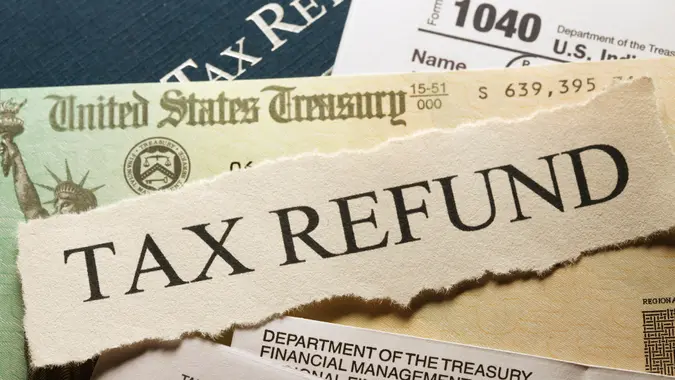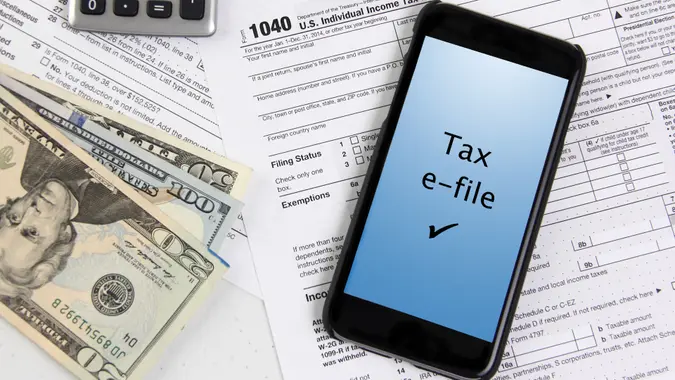Tax Deadline and Tax Due Dates for Your 2023 Taxes

Commitment to Our Readers
GOBankingRates' editorial team is committed to bringing you unbiased reviews and information. We use data-driven methodologies to evaluate financial products and services - our reviews and ratings are not influenced by advertisers. You can read more about our editorial guidelines and our products and services review methodology.

20 Years
Helping You Live Richer

Reviewed
by Experts

Trusted by
Millions of Readers
Tax season is unavoidable, so there is little excuse not to plan ahead. The biggest hurdle in not paying your taxes on time is simply not knowing when they are due. That being said, when are your 2023 taxes due?
See: What To Do if You Owe Back Taxes to the IRS
Quick Take: When Are Taxes Due for 2023?
Be sure to mark Apr. 15, 2024, as the tax payment deadline for your 2023 taxes and plan accordingly for both your federal income taxes and state taxes. Whether you file electronically online, on paper, or seek professional assistance especially if you have questions about specific items such as capital gains tax or FICA tax. Make sure to meet the deadline to stay in good standing with the IRS. The deadlines differ for individuals versus businesses, and it depends in part on whether you use a calendar year or a fiscal year.
Apr. 15, 2024, is also known as Tax Day. It’s the final day to file your federal income tax return and state return without facing any penalties for late filing. Mark this date on your calendar to ensure you meet the deadline and don’t incur late penalties or additional fees.
Tax Filing Deadlines and Important Dates
Although you can file for a tax extension, the extension only extends to your tax forms and your income tax deadline to file. It doesn’t change your payment due date or any tax credits you may have when you file your return. Note that if you applied for certain credits, like the earned income tax credit or the additional child tax credit, the agency will not issue your refund until at least mid-February.
Mark Your Calander for These Tax Deadlines
| Tax Dates | Deadline Variants |
|---|---|
| Jan. 16, 2024 | If you pay your taxes quarterly this was the due date for your estimated tax payments for the 4th quarter. This includes income you earned from Sept. 1 through Dec. 31, 2023. |
| Jan. 29, 2024 | Tax filing season begins and the IRS begins to accept and process federal tax returns on Jan. 29, 2024. |
| Jan. 31, 2024 | By this date, you should receive your W-2 form. This deadline is for employers who must mail or furnish W-2 forms or 1099 forms to all employees who worked for them in 2023. |
| Feb. 15, 2024 | If you are tax-exempt this would be your deadline to file a Form W-4 with your employer if you intend to reclaim the exemption for 2024. |
| April 15, 2024: Tax Day | For regular filing of your state or federal tax return, this is the deadline. You must file your taxes with the IRS on or before this date to avoid paying late penalties. If you need to file for an extension, keep in mind this is also the deadline for that, and you still must pay what you owe. If you pay your taxes quarterly, this is the due date for your estimated tax payments for the 1st quarter. This includes income you earned from Jan. 1 through Mar. 31, 2024. |
| June 17, 2024 | If you pay your taxes quarterly this is the due date for your estimated tax payments for the 2nd quarter. This includes income you earned from April 1 through May 31, 2024. If you are an American living outside of the U.S. this is your tax deadline as you get a two-month extension if you live abroad. |
| Sept. 16, 2024 | If you pay your taxes quarterly, this is the due date for your estimated tax payments for the 2nd quarter. This includes income you earned from June 1 through Aug. 31, 2024. |
| Oct. 15, 2024 | If you filed for a tax extension on or before Apr. 15, 2024, you have until this date to finalize your return and make sure the IRS accepts it. |
| Dec. 31, 2024 | Make sure to get all of your 401(k), Roth 401(k) contributions or other employer-sponsored retirement plan contributions in by this date. This is also the charitable donation deadline. Make sure you itemize these deductions by this date to ensure you lower your taxable income. |
Tax Extension Deadlines
If you need more time to prepare your tax return, you can request an extension. For the 2023 tax year, the extension deadline is typically Oct.15, 2024. However, keep in mind that an extension to file does not grant an extension to pay any taxes owed. You must estimate and pay any taxes owed by the original deadline to avoid penalties and interest.
Here are some key takeaways:
- Paying what you expect to owe on or before tax day avoids interest and penalties.
- If you estimate too little, you’ll owe interest on the unpaid portion, but you won’t be charged late-payment penalties if you pay at least 90% of what you owe by the standard tax deadline and you pay the remainder in full when you file your taxes by the extended tax return date.
- Whether you’re an individual or a business, be sure to stick to the applicable deadlines if you want to avoid paying interest and late fees — which can include a maximum 22.5% penalty for filing late and a separate penalty for paying late.
- The late payment penalty can be up to 25% of your unpaid taxes.
- The IRS advises that it’s better to file on time — even if you can’t pay in full — to avoid extra fees.
Final Take To GO
The bottom line is that understanding tax deadlines and due dates is important so that you stay compliant with tax laws and avoid paying penalties. Don’t end up paying more just because you forgot when your taxes were due. Paying taxes is never fun, but making sure you do so on time definitely alleviates any needless stress.
FAQ
- What are my estimated tax payments in 2024?
- If you have taxable income from being self-employed or you have a business, you will need to make estimated tax payments throughout the year because you're required to pay income taxes as you earn your income. Note that generally, you should only expect to pay estimated tax if you think you'll owe at least $1,000 in tax for tax year 2023. Employees who receive W-2 forms generally meet the pay-as-you-go requirements through income tax withholding from their paychecks.
- What ways can I file my taxes?
- There are various ways you can file your taxes such as the following options:
- Online or e-filing: Use tax software or online platforms for a convenient and efficient way to file your taxes.
- Paper filing: If you prefer traditional methods, you can fill out a paper tax return and mail it to the IRS.
- Professional help or CPAs: Consider hiring a tax professional or accountant to assist you with your tax preparation if you have complex tax situations.
- There are various ways you can file your taxes such as the following options:
- What if tax day is on a weekend?
- If April 15 falls on a weekend or a holiday, the tax deadline usually gets extended to the next business day. So, always double-check the specific deadline each year to avoid any confusion.
- What is a tax fiscal year?
- Not all taxpayers use Jan. 1 through Dec. 31 as their tax year. Some use a fiscal year, which is 12 months ending on the last day of any month except December, according to the IRS. In general, companies are the only ones that use a fiscal year for tax purposes, but if you are an individual and you keep your financial records based on an adopted fiscal year, you can apply to use the fiscal year instead.
Our in-house research team and on-site financial experts work together to create content that’s accurate, impartial, and up to date. We fact-check every single statistic, quote and fact using trusted primary resources to make sure the information we provide is correct. You can learn more about GOBankingRates’ processes and standards in our editorial policy.
 Written by
Written by  Edited by
Edited by 

























